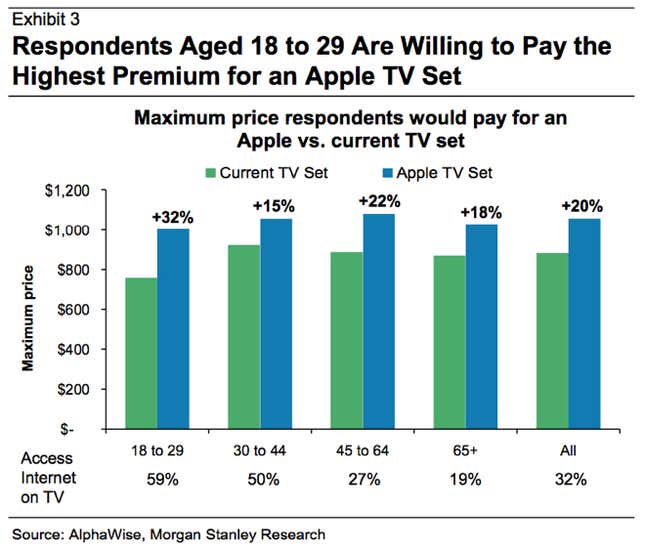Consumers really, really want a television built by Apple, says a recent survey, but they aren’t about to get one, says a former Apple executive. If the pent-up demand for a better television experience is so great, with a potential market of up to 56 million devices in the US alone, why wouldn’t Apple, with its bottomless reserves of cash, dive right in?
Perhaps the very reasons consumers want an “iTV” are the same ones preventing Cupertino from giving them one.

1. Apple sells experiences
Consumers don’t hate their TVs. They hate the TV industry. Consumers want a-la-carte, on-demand everything. They want television to be like the internet. When they turn on that box in the living room, they don’t want to feel, as Apple CEO Tim Cook put it, “like I have gone backwards in time by 20 to 30 years.”
For Apple to turn TV into a seamless, Apple-like experience, the company would have to find a way to circumvent the monopoly of America’s local cable providers and equally powerful cable television networks. Steve Jobs already did something like that with the music industry, and look what happened to them. Every cable executive on the planet remembers that.
Or take the example of the iPhone. In order to create an Apple experience on a phone, Apple played hardball with AT&T, and the result was an inversion of the usual power dynamics between handset makers and carriers. Apple got pretty much everything it wanted—control over device specifications, profits from its own app store—and AT&T got exclusive access to the iPhone, but only for a little while.
2. Cable networks like the status quo just fine
Cable networks, on the other hand, have no interest in exposing themselves to the economics of the internet. Every media industry that has embraced some version of “information wants to be free” has discovered, painfully, that existing distribution methods, in which content is bundled together or tied to a particular medium, are full of cross-subsidies that no one thought about until they were gone.
Apple already makes a set-top box, the Apple TV, which accesses content through the internet. It has countless competitors. Every single one of them would like to obliterate the line between television and the internet, and none of them are going to succeed as long as cable networks can earn record profits on the backs of a handful of very popular shows that are showing nowhere else, unless you count piracy.
3. An iTV would be the least Apple product ever
Apple does not make commodity anything. The premium it charges for its products is so large that it produces the lion’s share of profits in a mobile industry where it has a minority share of the market. Consumers pay that premium because Apple differentiates itself by creating the best user experience in an industry, by whatever combination of hardware and software is required.
Television is not a market in which Apple can de-materialize an entire medium, as it did with music, or upset the balance of power between those who create infrastructure and those who depend on it, as it did in the mobile industry. And one of the reasons Apple can’t do to television what it did to those industries is that television and movie executives have those cautionary examples in their mental rolodexes of how not to decimate their profit margins.
So an iTV could have all the design flourishes of any other Apple device, but consumers would never be satisfied with it. If it had the best picture ever, it would compete with models produced by the very companies who provide the iTV’s display to Apple. If it had the most logical interface for navigating cable and streaming television options, savvy consumers would wonder why they shouldn’t just buy a box that does the same thing, like an Apple TV, and hook it up to a comparable television. And if Tim Cook negotiated a deal to turn iTunes into a streaming service, a Netflix-killer, he’d still be up against the companies that Netflix cannot best: the cable networks themselves.
There simply isn’t an industry-redefining point of entry for Apple in television. Which means the company has no opportunity to create an experience for people that is, in sum, different from and substantially different than all the other options out there.
Some analysts insist that Apple is building a television, anyway. And Tim Cook has said television is an area of “intense interest” for the company. But what he almost certainly means, says former Apple executive Jean-Louis Gassée, is that “Apple’s CEO is indicating that he’ll continue to invest talent and money until the TV obstacles [i.e. old models of distribution] are finally surmounted.” In other words, some day Apple could reach an agreement with cable providers themselves, leading to competition and a reconstituted television and even movie industry. But there’s no telling when that “some day” will be.




